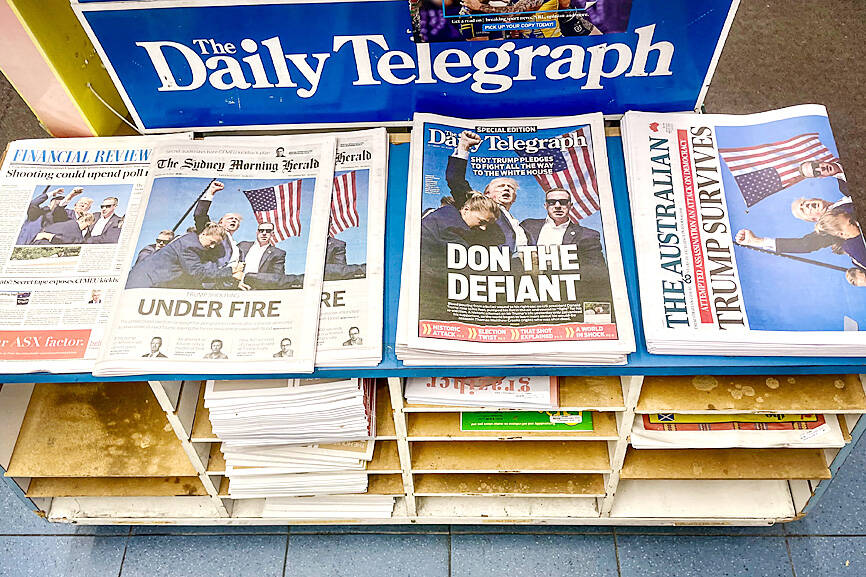Equity markets yesterday were mixed as investors weighed the effects of the assassination attempt on former US president Donald Trump with data suggesting it has boosted his chances of being re-elected president.
Eyes are also on a key meeting of China’s top leadership in Beijing, with hopes for measures to boost the world’s No. 2 economy, which grew less than expected in the second quarter.
Investors struggled to extend the rally enjoyed on Wall Street last week, where all three main indices ended on a positive note, despite a forecast-topping read on US wholesale prices.

Photo: AFP
The figures were not enough to overshadow Thursday’s news that the US consumer price index had slowed more than expected last month, which ramped up bets on a US Federal Reserve interest rate cut in September.
However, investors are keeping a close eye on developments in the US after Trump was on Saturday wounded at a rally ahead of the Republican National Convention this week.
While the odds of him beating US President Joe Biden had been rising in the past few weeks, they got an extra lift from the shooting.
Observers said a Trump victory could lead to lower corporate taxes — a boost for companies’ bottom lines — but also an increase in tensions with China with fresh tariffs possible.
“The assassination attempt might lead to a temporary boost in the polls for Trump, but a lot can change before November,” Moody’s Analytics economist Katrina Ell said. “Financial markets are expected to soon refocus on the Federal Reserve and the growing likelihood of a rate cut in September.”
Equity markets were mixed yesterday, with the TAIEX closing down 37.57 points, or 0.16 percent, at 23,879.36 in Taipei.
Shares in Hong Kong, Wellington, Bangkok and Jakarta also dropped, along with those in London, Paris and Frankfurt, while in Shanghai, Seoul, Mumbai, Sydney, Singapore and Manila, shares rose.
The US dollar yesterday rose, having softened last week owing to the prospect of lower rates. A potential return of Trump as the next US president might bring bad news for emerging-market currencies, given the threat of his protectionist economic policies.
The won led the broader declines in Asia and the New Taiwan dollar also edged lower. Indonesia’s rupiah and Thailand’s baht snapped eight days of gains, while Malaysia’s ringgit slipped from its highest level in January. Meanwhile, Mexico’s peso fell 0.8 percent and the South African rand was down 0.6 percent.
Official data showed the Chinese economy expanded just 4.7 percent year-on-year in the second quarter, well below the 5.1 percent forecast in a survey by Bloomberg and short of the government’s 5 percent goal.
Separately, retail sales slowed sharply last month as the country’s army of consumers remained cautious.
The “data releases showed that the road to 5 percent growth remains difficult, and more fiscal and monetary policy support will be needed in the second half of the year if this year’s key growth target is to be achieved,” ING Bank NV chief economist for Greater China Lynn Song (宋林) said.
Additional reporting by Bloomberg

Shares in Taiwan closed at a new high yesterday, the first trading day of the new year, as contract chipmaker Taiwan Semiconductor Manufacturing Co (TSMC, 台積電) continued to break records amid an artificial intelligence (AI) boom, dealers said. The TAIEX closed up 386.21 points, or 1.33 percent, at 29,349.81, with turnover totaling NT$648.844 billion (US$20.65 billion). “Judging from a stronger Taiwan dollar against the US dollar, I think foreign institutional investors returned from the holidays and brought funds into the local market,” Concord Securities Co (康和證券) analyst Kerry Huang (黃志祺) said. “Foreign investors just rebuilt their positions with TSMC as their top target,

H200 CHIPS: A source said that Nvidia has asked the Taiwanese company to begin production of additional chips and work is expected to start in the second quarter Nvidia Corp is scrambling to meet demand for its H200 artificial intelligence (AI) chips from Chinese technology companies and has approached contract manufacturer Taiwan Semiconductor Manufacturing Co (TSMC, 台積電) to ramp up production, sources said. Chinese technology companies have placed orders for more than 2 million H200 chips for this year, while Nvidia holds just 700,000 units in stock, two of the people said. The exact additional volume Nvidia intends to order from TSMC remains unclear, they said. A third source said that Nvidia has asked TSMC to begin production of the additional chips and work is expected to start in the second

REVENUE PERFORMANCE: Cloud and network products, and electronic components saw strong increases, while smart consumer electronics and computing products fell Hon Hai Precision Industry Co (鴻海精密) yesterday posted 26.51 percent quarterly growth in revenue for last quarter to NT$2.6 trillion (US$82.44 billion), the strongest on record for the period and above expectations, but the company forecast a slight revenue dip this quarter due to seasonal factors. On an annual basis, revenue last quarter grew 22.07 percent, the company said. Analysts on average estimated about NT$2.4 trillion increase. Hon Hai, which assembles servers for Nvidia Corp and iPhones for Apple Inc, is expanding its capacity in the US, adding artificial intelligence (AI) server production in Wisconsin and Texas, where it operates established campuses. This

US President Donald Trump on Friday blocked US photonics firm HieFo Corp’s US$3 million acquisition of assets in New Jersey-based aerospace and defense specialist Emcore Corp, citing national security and China-related concerns. In an order released by the White House, Trump said HieFo was “controlled by a citizen of the People’s Republic of China” and that its 2024 acquisition of Emcore’s businesses led the US president to believe that it might “take action that threatens to impair the national security of the United States.” The order did not name the person or detail Trump’s concerns. “The Transaction is hereby prohibited,”